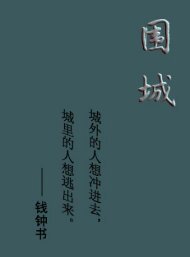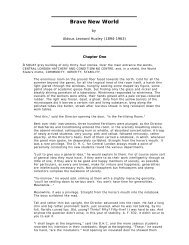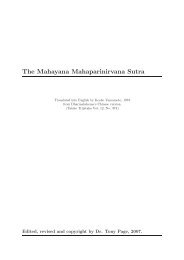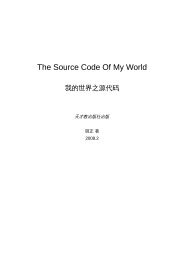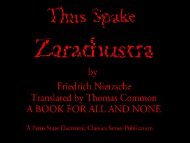Aphoristic Writings, Notebook, and Letters to a Friend, by Otto ...
Aphoristic Writings, Notebook, and Letters to a Friend, by Otto ...
Aphoristic Writings, Notebook, and Letters to a Friend, by Otto ...
Create successful ePaper yourself
Turn your PDF publications into a flip-book with our unique Google optimized e-Paper software.
What also always leads <strong>to</strong> determinism is the fact that struggle is made necessary<br />
continuously. In a particular case the decision may follow quite ethically, <strong>and</strong> man<br />
may decide himself for the Good; yet the decision is not lasting, he must struggle<br />
anew. There is freedom, one might say, only for the moment.<br />
And that lies in the concept of a freedom. For what kind of a freedom would it be<br />
which I, through a good act from some earlier time, had brought forth, caused, for all<br />
time? It is the very pride of man that he can be free anew at every moment.<br />
So for the future, as for the past, there is no freedom; man has no power over<br />
them.<br />
That is why man can also never underst<strong>and</strong> himself: For he is himself a timeless<br />
act; an act which he performs continuously, <strong>and</strong> there is no moment in which he might<br />
not perform it, as there would have <strong>to</strong> be <strong>to</strong> underst<strong>and</strong> himself. 6<br />
Morality expresses itself thus: Act in full consciousness, that is, act so that in<br />
every moment you are whole, your entire individuality is there. Man experiences this<br />
individuality over the course of his life only in successive moments: that is why time<br />
is immoral <strong>and</strong> no living person ever holy, perfect. If man once acts with the strongest<br />
will so that all universality of his self (<strong>and</strong> of the world, for he is indeed the<br />
microcosm) is set in the moment, then has he overcome time <strong>and</strong> become divine.<br />
The most powerful musical motifs of the world’s music are those which attempt <strong>to</strong><br />
represent this breaking through time within time, this breaking forth out of time,<br />
where such an ictus 7 falls on one note that it absorbs the remaining parts of the<br />
melody (which represent time as a whole, individual points integrated <strong>by</strong> the I) <strong>and</strong><br />
there<strong>by</strong> transcends the melody. The end of the Grail motif in Parsifal, <strong>and</strong> the<br />
Siegfried motif, are such melodies.<br />
There is however one act which, so <strong>to</strong> speak, resorbs the future in<strong>to</strong> itself,<br />
experiences in advance all future falling back in<strong>to</strong> immorality already as guilt, no less<br />
than all past immorality, <strong>and</strong> there<strong>by</strong> surpasses both: a timeless positing of character,<br />
rebirth. It is the act through which genius arises.<br />
It is a moral dem<strong>and</strong> that in every action the whole individuality of the person<br />
should become apparent, each should be a complete overcoming of time, of the<br />
unconscious, <strong>and</strong> of the narrowness of consciousness. Most of the time however, man<br />
does not do what he wills, but what he has willed. Through his decisions, he always<br />
gives himself only a certain direction, in which he then moves until the next moment<br />
of reflection. We do not will continuously, we only will intermittently, piece <strong>by</strong> piece.<br />
We thus save ourselves from willing: principle of the economy of the will. But the<br />
higher man always experiences this as thoroughly immoral. Present <strong>and</strong> eternity are<br />
connected; timeless, universal, logical reasonings have the form of the present (logic<br />
is achieved ethics): <strong>and</strong> so also should all eternity lie in every present. We also must<br />
6<br />
Parsifal motif (variation), Act III, (“The hallow’d spear, I bring it back <strong>to</strong> thee”.) [Rappaport]<br />
7<br />
ictus n [L, lit., blow, fr. icere <strong>to</strong> strike] (1752): the recurring stress or beat in a rhythmic or metrical<br />
series of sounds. [Trans]<br />
2



